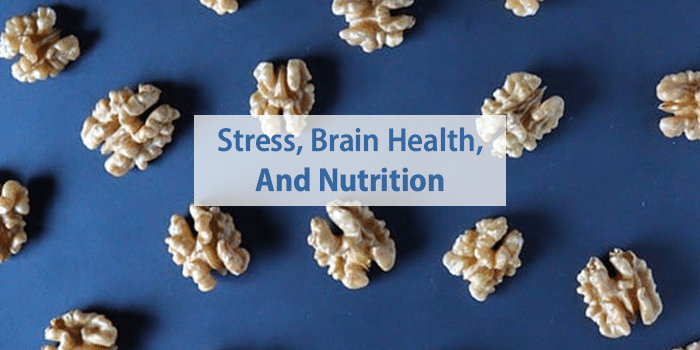May 19, 2021
Stress, Brain Health, and Nutrition
BRAIN HEALTH & NUTRITION
- Food is fuel for your brain. High-quality, nutrient-dense foods support brain function and mood.
- Multiple studies have found a correlation between a diet high in refined sugars and impaired brain function — and mood disorders, such as depression.
- Antioxidants protect from tissue oxidation – Oxidative stress and inflammation are two processes that go hand in hand during the aging process and in neurodegeneration and disease.
- Blood sugar regulation minimizes inflammation
- Mood and blood sugar. Blood sugar highs and lows can influence energy levels, resulting in mood swings and even affect sleep quality.
- Food sensitivity and concentration – did you know that food sensitivities, specifically gluten, can result in neurochemical disorders resulting in brain fog, ADD, depression, and anxiety, around other systemic inflammatory responses.
NUTRITION
- Low glycemic food – Diets high in refined sugars are harmful to the brain – worsening your body’s regulation of insulin, promoting inflammation and oxidative stress. Inflammation impacts our ability to make good decisions
- Mediterranean diet – high in omega 3 fatty acids and whole foods
- Identify and eliminate food sensitivities (can be done through food sensitivity testing).
BRAIN FOOD & SUPPLEMENTATION
- Healthy Fats Researchers have found that different omega 3s protect the brain and may be able to treat a variety of different brain conditions. Research has shown that fish oil may improve brain function in people with age-related cognitive decline, improve depression as much as pharmaceutical antidepressants, and when taken during pregnancy, provide lasting effects on fetal brain development.
- Sources: (Monounsaturated Fats & Omega 3 Fats) – from sources such as cold-water fatty fish (salmon, sardines, mackerel), nuts (walnuts, almonds, pistachios), olive oil, avocado.
- Choline (egg yolks, apple skin)- involved in several essential brain functions; it helps the brain create and release acetylcholine, which is crucial to memory. Acetylcholine tends to be lower in people with Alzheimer’s disease.
- Flavonoids – researchers found that the flavonoids in cacao help with neuron and blood vessel formation in the parts of the brain that govern memory and learning.
- Probiotics (microbiota, gut-brain axis)
LIFESTYLE
- Stress management
- Sleep – Restorative sleep is a major factor in making good decisions and it calms the amygdala (the part of the brain that drives the “fight or flight” response and plays a pivotal role in memory).
- Activity
 5-star Fitness
5-star Fitness
 5-star Fitness
5-star Fitness
